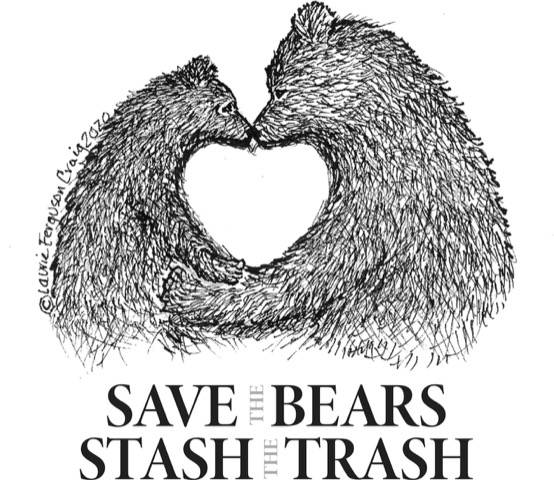By Laurie Craig
As a park ranger at Mendenhall Glacier Visitor Center, I spent years teaching thousands of people to ethically watch and love bears. Together, we safely observed mother bears tenderly nurse and play with their cubs. We watched the bears nap in trees and catch bright red salmon in Steep Creek. We watched bears live wild lives. Although I retired two years ago, my concern for bears and people continues.
Keeping human food away from bears at the glacier was always, and continues to be, key to bear and human safety. This is true in Juneau’s neighborhoods, as well.
Bears are in trouble now. They are being drawn into our neighborhoods by easy meals of garbage. A few simple steps can save their lives. A bear is most hungry in autumn — their last chance to build fat reserves for hibernation.
Helping is easy: rinse, freeze hold.
At home, rinse out food containers before putting them into your trash or recycling bins. Freeze smelly items to reduce their attraction to bears and other wildlife. Hold trash cans in a secure structure until 4 a.m. on the morning of trash pickup. Clean and frozen trash won’t give off as much scent, which means it’s less of a hassle to store inside.
Use a bear-resistant trash can. Most trash cans in Juneau are not bear resistant. This week, I joined the Juneau Bear Committee to affix yellow stickers to cans that are not bear resistant to help reduce confusion for customers.
Our trash hauler, Alaska Waste, offers bear resistant cans for an additional fee of about $7 per month. More bear resistant cans are due to arrive soon. Call the company at 780-7800 for details and to get on the first-come, first-served list for one of the new arrivals. Or, add your name to next year’s waiting list so enough cans will be ordered for 2021. Currently, 100 neighbors are on the 2020 waiting list.
[Group works to remind there is no such thing as bear-proof]
Replace broken cans. If your can — especially a bear-resistant can — is broken, call the waste hauler to replace it. That notification is the homeowner’s responsibility. Cans can be replaced free once a year by the company, so if yours is shabby, get a new one.
Dumpsters are especially important because they contain so much trash. Apartment and condo tenants should follow the same rinse, freeze and hold procedures. Learn how to operate and secure the dumpsters, reinforce the lids, and keep out bears. It is the landlord’s responsibility to make sure that dumpsters function properly.
Remove food and wrappers from the car. Keep the doors locked at all times to prevent bears from opening the vehicle and climbing in.
Years ago, when 20 bears were killed because of trash, outraged Juneau residents demanded the city take action. The Urban Bear Ordinance was created to provide incentive and enforcement. The first step is education; the next step is citations and costly fines. Call Juneau Police at 586-0600 to contact Community Service Officers if a neighborhood is in need of help.
Alaska Department of Fish and Game also has regulations to prevent people negligently or intentionally giving human food to bears.
Sadly, bears have paid for our carelessness with their lives. Nine bears were killed this year; four were relocated. The problems continue and more bears will die if we don’t clean up our trash and eliminate attractants.
Bears live long lives and rely on wild foods. Several familiar bears are 20-plus years old. They are the matriarchs, the clan mothers, of wild bears. GPS collar data from some bears show they spend a small amount of time seeking trash, and mostly live in the woods. They should not be condemned as “garbage bears.” They are good bears lured into bad places. The forest provides bears’ natural foods, but in lean years like this, they search for easy meals like trash. Bear scat reveals they ate plastic and human garbage.
For years, we have loved watching bears, following their lives and rejoicing at their annual return. Now we need to save bears. Please post the image embedded with this article in your kitchen to remind your family that bears’ survival is in our hands.
• Laurie Craig is an artist, naturalist, and retired Forest Service park ranger who worked at Mendenhall Glacier Visitor Center from 2004-2018. Columns, My Turns and Letters to the Editor represent the view of the author, not the view of the Juneau Empire. Have something to say? Here’s how to submit a My Turn or letter.

